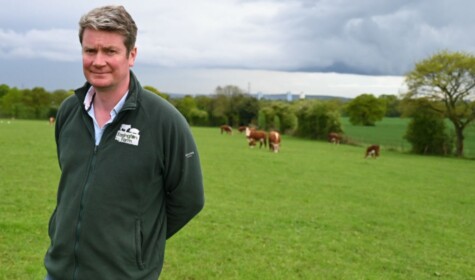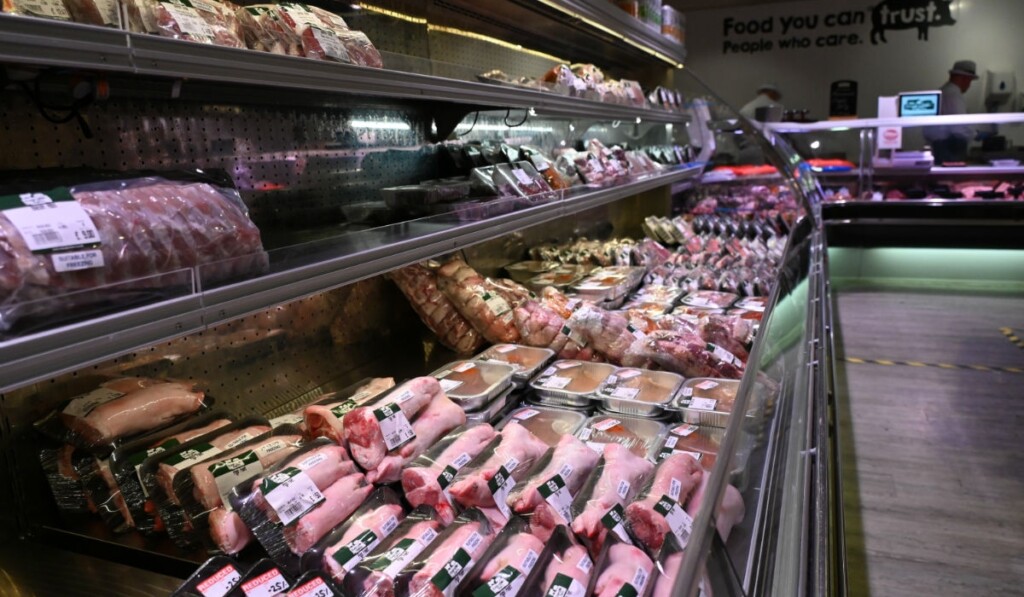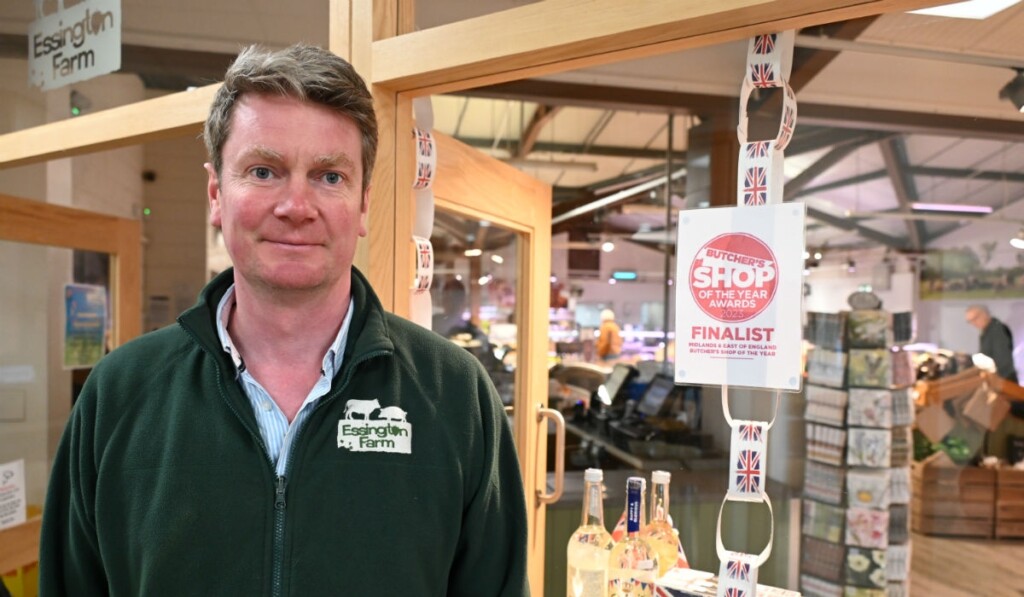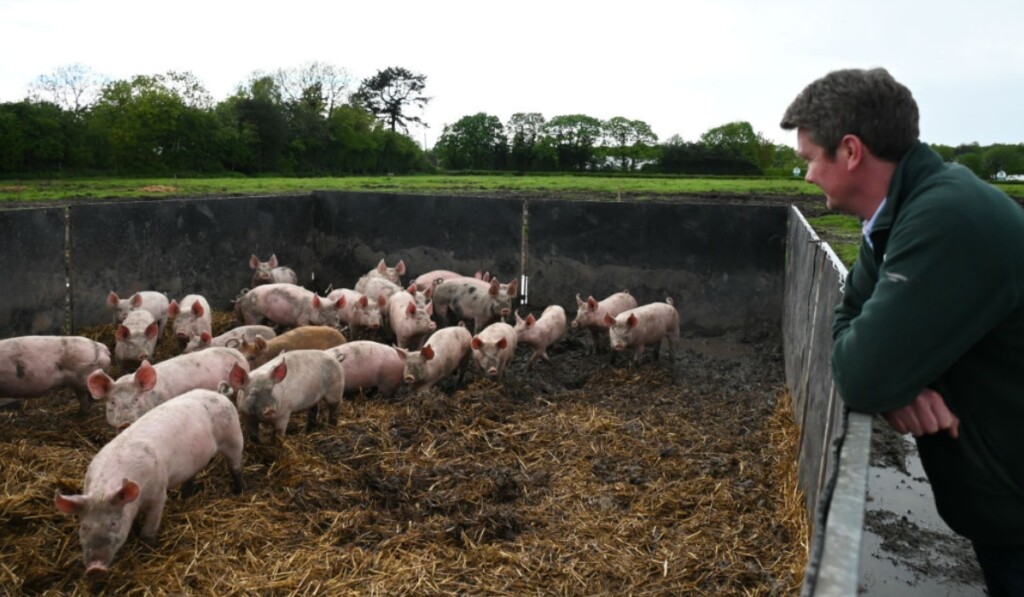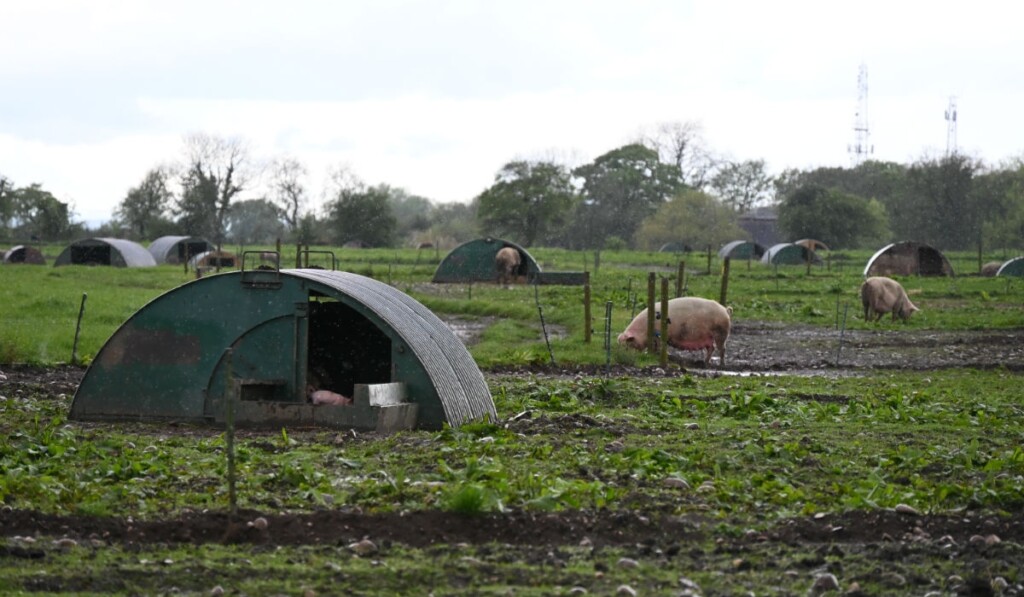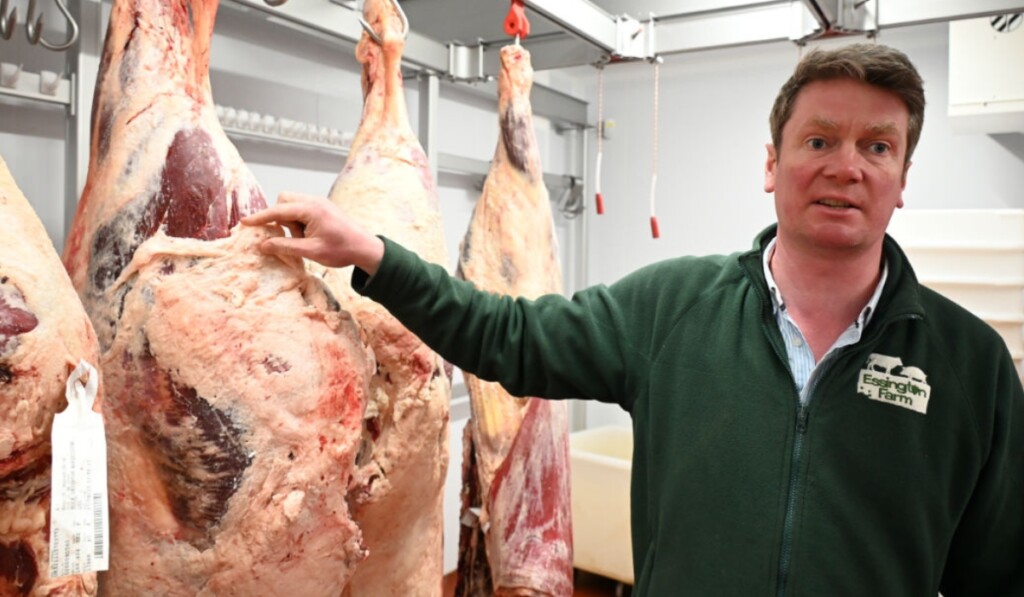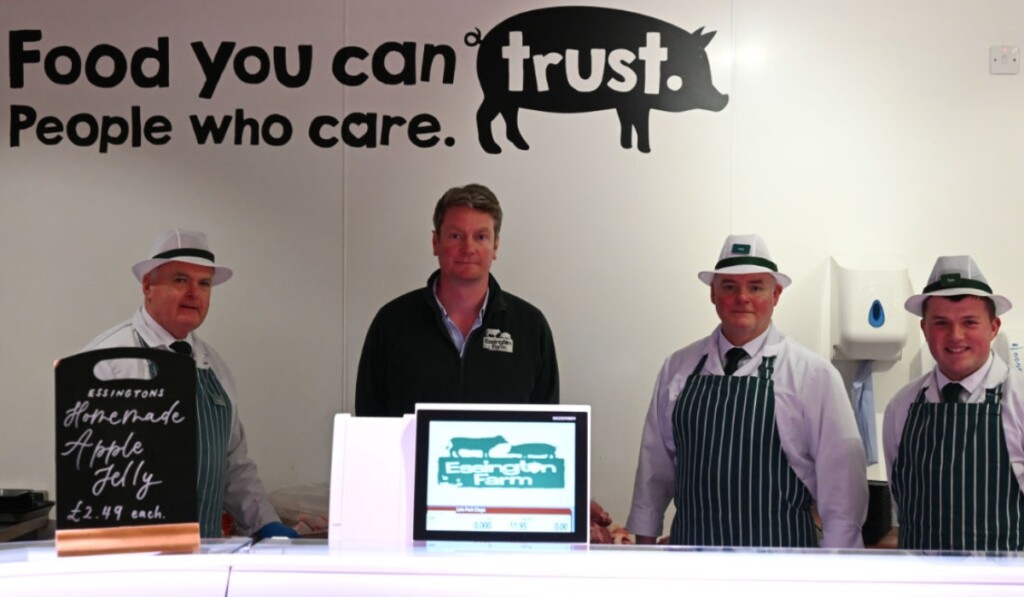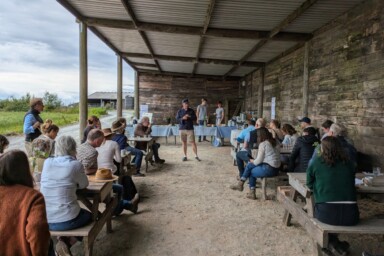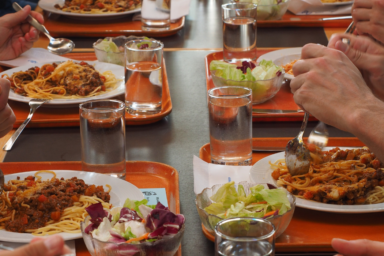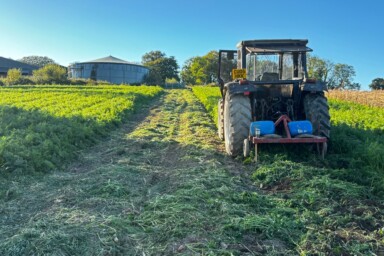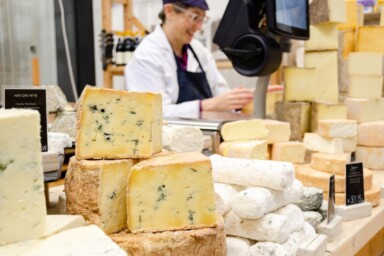In our series of butcher profiles, food and farming writer, Marianne Landzettel, meets butchers from across the UK who have built their business around high welfare, sustainably produced meat. Farmer, Will Simkin, has developed an extensive farm shop with a tearoom and restaurant, selling his own pork and beef, along with vegetables produced on the farm.
On a rainy day in May, Wolverhampton may not present its prettiest side, but to meet farmer Will Simkin, we need to get a few miles out of the city. Essington Farm is situated amidst beautiful countryside with cattle and sheep grazing or resting under gnarled oak trees and well-maintained hedges along the narrow roads. If it weren’t for the signposts, first time visitors to the farm shop and butchers might well miss the entrance.
The shop is housed in a modern, one-storey building. Next to the entrance is an eye-catching display of bedding plants which are grown in one of the farm’s greenhouses. The farm’s tearoom and restaurant beckon, but we head straight for the shop – a beautiful, well-lit space with a wide choice of fruit and vegetables at the centre and two long deli and meat counters along the walls. Several butchers are serving the customers needing cooking advice, requesting special cuts or wanting to place an order. But most shoppers simply choose from the array of packed meats, sausages, burger patties and ready to cook items on the refrigerated shelves or are just here to pick up some readily packed pigs’ trotters or liver.
It’s not unusual for a farm shop to sell meat, but why did Simkin decide to open a ‘state-of-the-art’ butcher shop, I ask. “Because we already had the pigs,” says Simkin, “it was simply a logical next step.”
The farm was founded by Simkin’s great-great-grandfather in 1892, which makes Will Simkin a fifth-generation farmer. From the age of 14, he looked after a small group of pigs. There were always beef cattle, too, but Simkin liked working with the pigs. “They are friendly in nature, they are really clever and I found working with them rewarding,” he says.
After graduating from school, Simkin studied at Harper Adams University. He always knew that eventually he would return to Essington Farm, but first he wanted to see a bit more of the world. A gap year of just travelling didn’t feel right, so he took a job on a palm oil plantation in Papua New Guinea. In 2005, aged 23, he returned to the farm. His parents had opened a farm shop and restaurant in 1990 to directly market the fruit and vegetables the farm produced, and Simkin felt that adding a butchery would make financial sense.
With roughly 230 acres, the farm is relatively small, says Simkin, but “with pigs you can still work at scale, have a viable business and provide excellent animal welfare”. There are 70 Landrace and Duroc breeding sows which are crossed with Large White boars. The animals are kept in an extensive, outdoor system, which Simkin was happy to show us.
The large pasture is securely fenced and split into individual paddocks separated by electric fencing. The sows live in groups of six; only sows about to farrow (give birth) are moved to a ‘single occupancy’ paddock. Individual huts provide shelter and there is plenty of space to explore, soil to root through and mud to wallow in. The piglets can move freely under the electric fences. Unlike piglets brought up in confinement which are weaned at four weeks or even earlier, these pigs stay with their mums for about eight weeks until they are basically teenagers, and their mums are naturally ready to see them go. As we arrive, we are greeted by a ‘gang’ of about 10 (roughly two-month-old) piglets ‘patrolling’ near the gate; another group is sheltering under a tree. A younger piglet on a solitary excursion can’t quite remember who his mum is. He finds out quickly when he tries to suckle – sows don’t react kindly to kids from another litter wanting to feed.
To the side of the paddock are several large tents, each home to a group of 20 male or female weaned pigs. The canvas covers a spacious area with deep straw bedding, and towards the back is a good sized ‘run’ with one corner designated by the inhabitants as the ‘toilet’ – pigs are very clean and don’t soil their resting and feeding area. Because the animals have space to play and root, Simkin never has to dock the tails or treat with antibiotics, which is often necessary when piglets are weaned very early.
The pigs are slaughtered when they are between five and six months old. Every Thursday, a group of 20 to 25 is transported in a trailer with thick straw bedding to a small abattoir which is just over six miles away. They are slaughtered the same day and don’t have to spend a stressful night in an unfamiliar environment in close proximity to animals they don’t know. “I am really grateful that we have this small abattoir so close by, without it we couldn’t maintain a high welfare standard right to the end.”
Back at the shop, Simkin shows us the state-of-the-art butchery and cold storage space housed in a new purpose-built unit on the far side of the parking lot. Simkin has good butcher skills, but no formal training and he is far too busy with the many managerial tasks to regularly work in the butchery. At present, Essington Farm employs eight butchers. The abattoir returns whole sides of pig and beef to the farm, as well as livers and kidneys. The butchers cut and portion the meat, cure bacon, prepare sausages, burger patties and other products. Most of it is done in the butchery, but the shop has a bakery and a large kitchen, one side caters for the restaurant, the other processing food for the shop. “In 2016, we invested in new buildings and new equipment, after nearly 30 years the original farm shop looked quite tired,” says Simkin.
The floor space of the shop is now much larger. “We are right at the urban fringe here, many people come to do a regular weekly shop and we now have the space to provide for that. The tearoom is not the main attraction.” Everything the farm grows and produces is sold through the shop, all other items are sourced as locally as possible. Outside of the shop sits a trailer with an automated milk dispenser – the milk comes from a dairy just a mile up the road. “My father calls the shop the ‘one link food chain’.”
Will Simkin’s wife, Penny, drops by. “We have to make sure we don’t do too much,” she says. Initially, 34 different fruit and vegetables were grown on the farm; now the focus is on strawberries and other berries, plums and winter veg. With her background in finance and HR, she recruits staff and sorts out the rota – not an easy task with 70 full and part time workers and casual labour in the peak seasons.
Pork accounts for 40% of the meat sales: pig cheeks, livers, kidneys and even pig tails are in high demand, the latter mostly with customers of Chinese heritage. Pig brains on toast, however, is a Black Country speciality – one Will Simkin, personally, is not too keen on.
On average, around 3,000 customers come to the shop every week. How does Simkin see the future of the business? “We don’t want to grow massively and supply to supermarkets or the catering industry. We want to continue to provide quality, value and service,” says Simkin. What he would like to do is expand the beef herd. The farm is small and the available pasture is enough for 35 cow-and-calf pairs and youngstock. But in a purely grass-based systems, the animals take two years to reach their slaughter weight. The demand for beef at the shop is much higher and Simkin has to buy meat in. “It would be great if we could supply all the beef from our farm,” says Simkin. But apart from the money needed, it’s near impossible to buy or even just rent pastures being so close to an urban centre. For the time being the herd expansion will remain a dream.
With thanks to National Craft Butchers for helping us to develop this series. To find out more, visit NationalCraftButchers.co.uk.
Photos by @M.Kunz.
